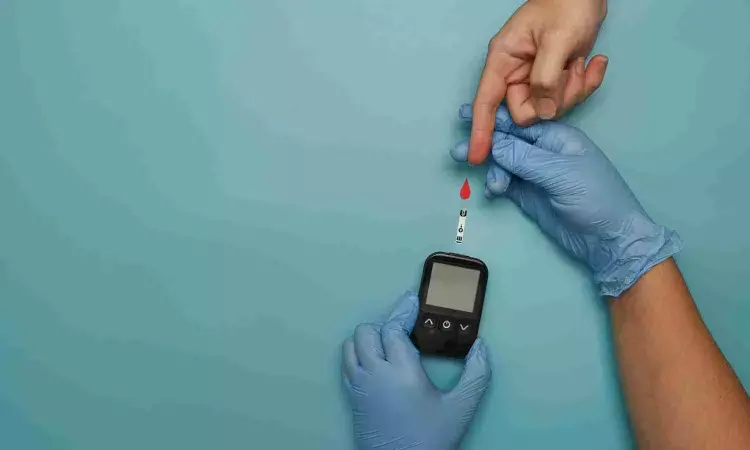- Home
- Medical news & Guidelines
- Anesthesiology
- Cardiology and CTVS
- Critical Care
- Dentistry
- Dermatology
- Diabetes and Endocrinology
- ENT
- Gastroenterology
- Medicine
- Nephrology
- Neurology
- Obstretics-Gynaecology
- Oncology
- Ophthalmology
- Orthopaedics
- Pediatrics-Neonatology
- Psychiatry
- Pulmonology
- Radiology
- Surgery
- Urology
- Laboratory Medicine
- Diet
- Nursing
- Paramedical
- Physiotherapy
- Health news
- Fact Check
- Bone Health Fact Check
- Brain Health Fact Check
- Cancer Related Fact Check
- Child Care Fact Check
- Dental and oral health fact check
- Diabetes and metabolic health fact check
- Diet and Nutrition Fact Check
- Eye and ENT Care Fact Check
- Fitness fact check
- Gut health fact check
- Heart health fact check
- Kidney health fact check
- Medical education fact check
- Men's health fact check
- Respiratory fact check
- Skin and hair care fact check
- Vaccine and Immunization fact check
- Women's health fact check
- AYUSH
- State News
- Andaman and Nicobar Islands
- Andhra Pradesh
- Arunachal Pradesh
- Assam
- Bihar
- Chandigarh
- Chattisgarh
- Dadra and Nagar Haveli
- Daman and Diu
- Delhi
- Goa
- Gujarat
- Haryana
- Himachal Pradesh
- Jammu & Kashmir
- Jharkhand
- Karnataka
- Kerala
- Ladakh
- Lakshadweep
- Madhya Pradesh
- Maharashtra
- Manipur
- Meghalaya
- Mizoram
- Nagaland
- Odisha
- Puducherry
- Punjab
- Rajasthan
- Sikkim
- Tamil Nadu
- Telangana
- Tripura
- Uttar Pradesh
- Uttrakhand
- West Bengal
- Medical Education
- Industry
Frequent Continuous Glucose Monitoring Significantly Improves Glycemic Control in Type 2 Diabetes: JAMA

A new study published in JAMA Network Open has identified that frequent use of continuous glucose monitoring devices is strongly associated with better long-term glycemic control among people with type 2 diabetes. These findings stress that it is not periodic monitoring but the consistent use of CGM that will play a vital role in sustaining glycemic improvement and optimizing diabetes management. The study was conducted by Irl B. and colleagues.
Poor glycemic control is the fundamental driver of diabetes-related complications, and while CGM adoption has increased in the management of type 2 diabetes, evidence linking frequency of use to measurable clinical outcomes has remained scant. This large-scale study fills that gap by analyzing real-world data to establish a clear relationship between CGM usage patterns and HbA1C outcomes over 12 months.
This retrospective, propensity score–matched, cross-sectional study used Optum deidentified Market Clarity Data, including insurance claims and electronic medical records collected from January 1, 2019, through December 31, 2023. The dataset included clinical information for 6 months before each participant's index date and 12 months of follow-up.
The study population included 9,258 adults aged 18 years or older with type 2 diabetes and baseline HbA1C levels between 7.0% and 15.0%. The participants were stratified into five groups based on the frequency of CGM use during the 12-month postindex period:
Control group (no CGM use): 4,629 patients
Frequency 1 (≥1 to ≤90 days): 1,081 patients
Frequency 2 (>90 to ≤180 days): 523 patients
Frequency 3 (180 to ≤270 days): 540 patients
Frequency 4 (>270 days): 2,485 patients
Change in HbA1C was analyzed relative to the frequency of CGM use compared to no CGM use by using mixed-model statistical methods.
Results
The mean (SD) age of participants was 55.9 (10.6) years, with 45.4% female (4,207 patients).
The primary outcome-change in HbA1C levels-showed a strong positive correlation between higher CGM use and greater improvement in glycemic control.
At 12 months, the high-frequency CGM group (frequency 4) had the greatest HbA1C reduction of −1.52 percentage points (95% CI, −1.73 to −1.32), compared with a reduction of only −0.63 percentage points (95% CI, −0.80 to −0.45) in the no CGM group.
Early improvements were evident at approximately 3 months, where all CGM user groups demonstrated significantly greater HbA1C reductions than controls:
Frequency 1: −0.59 percentage points (95% CI, −0.96 to −0.21)
Frequency 2: −0.57 percentage points (95% CI, −1.10 to −0.05)
Frequency 3: −0.79 percentage points (95% CI, −1.25 to −0.34)
Frequency 4: −0.91 percentage points (95% CI, −1.12 to −0.70)
Control group: −0.28 percentage points (95% CI, −0.47 to −0.09)
Most notably, there was no additional improvement beyond 6 months for CGM users in both frequency 2 and 3 groups, suggesting that partial or intermittent use does not confer continued benefits.
By contrast, patients in frequency 1 and frequency 4 groups had sustained glycemic improvements over the entire follow-up period.
The combination of frequent CGM use with a GLP-1 RA yielded even greater glycemic benefit, with a mean HbA1C treatment difference of −1.13 percentage points (95% CI, −1.46 to −0.80) compared with non-CGM users.
The present study found that frequent continuous glucose monitoring was associated with significantly better HbA1C outcomes in adults with type 2 diabetes compared with infrequent or no CGM use. The findings reinforce that continuous and consistent CGM use is necessary to achieve long-term glycemic stability and that clinicians should foster adherence and review CGM utilization on a regular basis to optimize therapeutic outcomes.
Reference:
Hirsch IB, Garg SK, Repetto E, et al. Continuous Glucose Monitoring Frequency and Glycemic Control in People With Type 2 Diabetes. JAMA Netw Open. 2025;8(10):e2539278. doi:10.1001/jamanetworkopen.2025.39278
Dr Riya Dave has completed dentistry from Gujarat University in 2022. She is a dentist and accomplished medical and scientific writer known for her commitment to bridging the gap between clinical expertise and accessible healthcare information. She has been actively involved in writing blogs related to health and wellness.
Dr Kamal Kant Kohli-MBBS, DTCD- a chest specialist with more than 30 years of practice and a flair for writing clinical articles, Dr Kamal Kant Kohli joined Medical Dialogues as a Chief Editor of Medical News. Besides writing articles, as an editor, he proofreads and verifies all the medical content published on Medical Dialogues including those coming from journals, studies,medical conferences,guidelines etc. Email: drkohli@medicaldialogues.in. Contact no. 011-43720751


